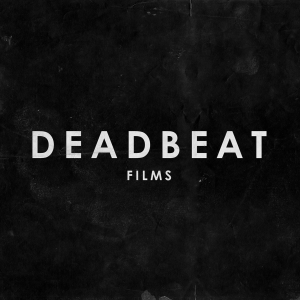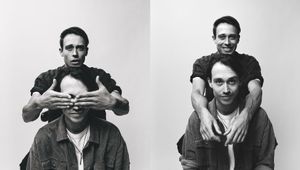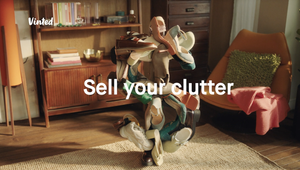
The Directors: Boris Thompson-Roylance

As a writer, director and interdisciplinary artist, Boris brings a cinematic flair and signature light-hearted humour to the world of commercials.
He is the co-founder and creative director of multi-award winning, London Based film production company, Deadbeat Films.
Name: Boris Thompson-Roylance
Location: London
Repped by/in: Deadbeat Films
Awards:
- Best Sci Fi Short - South African Independent Film Festival 2020: YOSHI
- Best of Festival - Depth of Field International Film Festival 2021: AYMAN
- Best Documentary Short - Port Blair Film Festival 2021: BAJO: Guardians of The Reef
- Award of Excellence - Docs Without Borders Film Festival 2020: AYMAN
- Silver Epica Award 2015: Jimmy’s Iced Coffee Commercial
- Best Music Video - Drum & Bass Awards 2015: The Prototypes - Pop it Off
What elements of a script sets one apart from the other and what sort of scripts get you excited to shoot them?
A great commercial script is when there’s the chance to explore a spark, a theme, a mood. Where there are images, ideas or concepts which you’ve always wanted to try out!
For me there’s always grip gear, camera techniques and characters I’ve been buzzing to explore and try but you’re just waiting for that right, killer brief. Something clicks in your brain, where you know you can bring something magic to it, and it all slots in together like a piece of a puzzle.
How do you approach creating a treatment for a spot?
I always start by having a conversation with the Creative Directors at Deadbeat. We bounce back ideas and get a feel of the brief.
Once I’ve read the brief there’s always at least one visual reference (this can be similar commercials, music videos, trailers) which sticks out. I watch it through, screenshot the images which match the brief and then begins a rolling stone of creative inspiration. I immerse myself in anything that can inspire me, working directly from something as literal as a painting, an old photograph or a phrase someone has said.. then build outwards...
Then, when I’ve accumulated all the imagery, I’ll look through every image and start piecing together a potential feeling, mood and perhaps even a narrative. When the feeling is clear in my head, I will stare at a blank piece of paper for at least an hour, procrastinate like crazy, and then start writing feverishly.
When I’ve written all the text, I’ll send it to the Creative Copy team, and we will bounce back the text a few times until we’re happy. I then move into putting the text and collated imagery into a deck. Here I’ll again work with my creative team and bounce back layout and imagery until we have a finished deck!
If the script is for a brand that you're not familiar with/ don’t have a big affinity with or a market you're new too, how important is it for you to do research and understand that strategic and contextual side of the ad? If it’s important to you, how do you do it?
Sure it is important to research previous videos from the brand, to get an idea of their style and approach to their films. However, often you’re being brought on because they like YOUR work, and looking for a fresh perspective. So often it’s important to just get that one feeling, as small as it is, and follow it through, then you’re making something unique, which is why you’re being hired!
For you, what is the most important working relationship for a director to have with another person in making an ad? And why?
The beauty of Directing is that every relationship is the most important. You are the conductor in an orchestra, making sure that your string section is on it’s A-Game, equal to the horns, percussion, it all contributes to the beauty of the symphony.
However if we’re talking about spots, or a big campaign, it’s best to have a strong relationship with the agency, because they’re the connection to the client. You want the agency on your side, to make sure that your idea isn’t being filtered down in the process. The best possible situation is to be talking directly to the client. Have regular meetings (zoom based these days) and try to dig as deep as possible. Make them laugh and get them by your side, then you can almost do anything you want!
What type of work are you most passionate about - is there a particular genre or subject matter or style you are most drawn to?
Any brand which has a sustainable message is important to me. Commercials are powerful tools, which can turn the axis on culture. This can also be incredibly damaging, socially and environmentally if the creative power is in the wrong hands… I often think of the story of the Trojan Horse. I enjoy creating commercials to have the ability to plant a hidden message of kindness, ethical morals, sustainable messages and plant them gently within the film to have its effects subconsciously to the viewer. My latest TCL spot celebrates the majestic beauty of the Indonesian Coral Triangle but is tainted by a huge giant rubber duck, the artificial invading the natural. Our work with Vinted has a strong sustainable message, inspiring people to ditch fast fashion and join the circular economy, it’s a movement which is growing and growing and it’s great to be a part of that change.
What misconception about you or your work do you most often encounter and why is it wrong?
I filmed a lot of live events and festivals between 2015-2018. Starting with our work for Wilderness Festival, we kinda pioneered the cinematic, narrative driven event film, no one was really doing it before. We treated filming these Festivals like you would for a commercial or music video, we took in large teams, with top level cameras and lenses, steadicams, the lot, and gallivanted around the festival, kitted up like Robo Cop filming actors in set up dramatic scenarios. They were chaotic, spontaneous environments, where we were often depending on intuition and feeling in order to capture the true, immersive festival experience. It then completely blew up and we were hired by basically every festival in Europe to make their aftermovies.
I was typecast as ‘the festival guy’, and it took a long time to break free from that stereotype, switch it up and be taken seriously as a commercial director.
Have you ever worked with a cost consultant and if so how have your experiences been?
I’ve never worked with a cost consultant, however I also work as a producer on projects and I have an exceptional working relationship with my Producer and Head of Production at Deadbeat, Anthony Toma.
The perks of being a Director and Creative Director/Co-Founder of Deadbeat Films means that I am involved from the very beginning of client relationships. I’m often having the first conversations with a new client, because I’m wearing my Creative Director hat. Alongside Anthony, I develop the brief, the deliverables and the core ideas, through numerous, in depth conversations with the client (or agency).
Once the brief is locked, this puts us in a really strong position, because we’ve already taken a deep dive into the costs, production and brief before I even begin the work as the Director.
What’s the craziest problem you’ve come across in the course of a production – and how did you solve it?
When filming a commercial in 2019, we were shooting a scene in the Iconic Rivoli Ballroom in Brockley, London, and both of our generators were stolen!
Our gaffers managed to tap the electricity from the location and the show must go on and all that, so we wrapped that scene up and did a unit move to our next location, a tower block apartment scene in Hackney. We turned up to film on the 16th floor, to discover that the elevator was broken, so the entire crew had to carry all the lights, camera and gear up 16 flights of steps!
Panting and sweating at the top, I discovered from my producer that our lead talent for the swimming scene the next day had dropped out last minute! After just being able to book our second choice in super speed and about to wrap, one of the team from the agency lost the product for the commercial…and the agency fired him… What a day!
Without the exceptional work of our Production team and the sheer commitment and dedication from the Deadbeat team, this mammoth project wouldn’t have been possible, and the final film was exceptional.
How do you strike the balance between being open/collaborative with the agency and brand client while also protecting the idea?
At the end of the day, you’re being hired, so you don’t want to cross the line. However they are hiring you for your creative talent, so don’t be afraid to push the boat and dream a little bigger. You’ve been chosen to bring a creative flair, they want your brain so use it!
What are your thoughts on opening up the production world to a more diverse pool of talent? Are you open to mentoring and apprenticeships on set?
There are many departments which are still heavily white male. The only way to diversify the crew is to bring in trainees, so then they grow and eventually become head of departments and therefore change the game. More women in the camera and lighting team, more ethnically diverse crew, bringing in trainees and investing in their future is the only way.
We are part of the government kickstart scheme, where we have employed a full time paid intern between the age of 18-24 and the government pays their salary. This is a chance for someone who’s always dreamed to work in film, get a foot in the door, and perhaps they will be running the company or their own in the future. It’s important we invest into the next future generation of leaders and industry disruptors.
How do you feel the pandemic is going to influence the way you work into the longer term? Have you picked up new habits that you feel will stick around for a long time?
Directing, wearing a face mask is not fun! It’s a lot harder to understand your crew's emotions and the same for the cast to understand my emotions, which for me is often very important. I’m a very empathetic, friendly director, and I like to give my team a lot of affirmation, so it’s a shame that I can’t give out hugs or high fives when they’ve done something awesome, but I guess elbows will do!
Deadbeat Films is a massive family, well quite literally because my identical twin brother Jack, is Co-Founder of the company and our top DOP!! We’re all a gang of best mates and spend a lot of time together in and out of set. My sets are loving places, where we’re not afraid to have fun. The Pandemic has made our working environments a little more frigid and awkward, but that just means we have to try harder to bring a vibe!
Your work is now presented in so many different formats - to what extent do you keep each in mind while you're working?
4:3 is a great ratio to film in. It’s cinematic and it’s great for social media! I grew as a filmmaker when 1x1, 2x5, 9x16 became staples within commercial deliverables. These formats are all very natural for me and are simply part of the process. You have to adapt, otherwise you’re going to be a cynical old dog!
What’s your relationship with new technology and, if at all, how do you incorporate future-facing tech into your work?
We have recently explored a deeper dive into live streaming, through a cinematic, live-streamed event with Swedish multi disciplinary performance company Svalbard. The event, which incorporated live music and immersive performance, invited the audience to jump aboard with the artists and experience this intimate event, with all the excitement and energy of a live show.
Yes, live streams have been around for a while, but never has it been such a mainstream, household name, thrust into the limelight out of the pandemic. With the ability to livestream from almost anywhere with impeccable signal, it allows us to create really cinematic, adventurous live streams, and push the boundaries as far as it can go.
Which pieces of work do you feel really show off what you do best – and why?
TCL. The Diver: I love comedy in commercials, to make people laugh is a really gift and spots are always a wonderful way to explore your funny bones. I love underwater shoots and this one was a hugely ambitious commercial involving specialised underwater performers, coral reef set builds, a beastly underwater alexa rig and of course some giant CGI ducks.
Vinted: Vintedist: With this video, we took an existing brand, and was given freedom to completely transform it, creating a fresh, super current digital campaign. This TVC was the third most watched advert in the UK in January 2021, just under Just Eat and Compare The Market.
Jimmy’s Iced Coffee: KYCU: Quite early in my commercial career, we created a hugely successful Hip Hop Satire based in Christchurch, Bournemouth. I spent the majority of the shoot in hysterics. Jimmy is a legend and threw himself into literally everything. Possibly the most fun I’ve had on set, and it really shows in the film. Also, the film was so successful, we made a sequel!
Secret Cinema - Stranger Things: Filming live events and festivals got me to where I am today. Filming cinematic, narrative driven scenarios in real life settings gave me the ability to be incredibly impromptu, agile and spontaneous in my directing style. I’ve been working with Secret Cinema for years now, but filming their Stranger Things production last year was my live magus opus.










